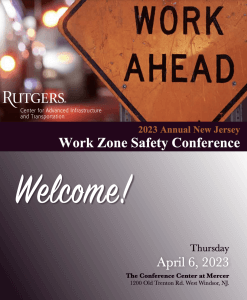
Rutgers CAIT hosted New Jersey’s annual Work Zone Safety Conference on April 6th. View photos from the event in the slideshow below.
This week (April 17-21) marks National Work Zone Awareness Week. For nearly a quarter of a century, National Work Zone Awareness Week has been spotlighting critical safety and mobility issues in and around work zones. Every spring, the Federal Highway Administration and its stakeholders sponsor activities to bring nationwide attention to this important topic.
Work zones are critical for upgrading and maintaining our roadways. The national transportation system not only provides critical access to the traveling public, but it plays a key role in supporting the Nation’s economy through the transport of vital goods and services. National Work Zone Awareness Week serves as an annual reminder that work zone safety and mobility for all road users—including motorists and vulnerable road users like pedestrians, bicyclists, and highway workers on foot—continues to be a significant issue that must be addressed.
During this year’s National Work Zone Awareness Week, the U.S. Department of Transportation’s (USDOT) Federal Highway Administration (FHWA) reaffirmed its commitment to improving safety for road construction workers and other vulnerable road users outside of vehicles. In 2021, the most recent year for which data are available, 956 people died in highway work zone crashes in the U.S., the District of Columbia and Puerto Rico. Crashes in highway work zones happen most frequently when drivers are speeding or aren’t paying attention to changing road conditions.
“Every person in a work zone is somebody’s parent, child, sibling, loved one, or friend, and we want every single one of them to return home safely to their loved ones when their shift is done,” said Federal Highway Administrator Shailen Bhatt. “By working closely with our state and local partners we are bringing the investments of the Bipartisan Infrastructure Law to bear in order to help save lives and strengthen the safety of those working in our nation’s construction zones.”
Here in New Jersey, Rutgers Center for Advanced Infrastructure and Transportation (CAIT) hosted the 2023 Work Zone Safety Conference earlier this month recognizing the need for increased safety and awareness on the state’s local roads and highways. The New Jersey Work Zone Safety Conference promotes work zone safety awareness on local and state roadways for a multi-disciplinary audience of construction, engineering, public safety, maintenance, and operations personnel.
View some photos from the event in the slide show below.
This year’s event commenced with a presentation by the New Jersey Department of Transportation on their updated 2023 Work Zone Safety Set-Up Guide. Other topics covered included Addiction Specialist Bonnie Nolan discussing the often-unspoken important topic of Opioid Addiction in the Workplace and how employers should address this health and safety issue; a keynote speech from Greg Stefan, Senior Vice President of Risk Control for Arch Insurance Group, on Work Zone Liability from the insurance carrier perspective; and presentations addressing some of the root causes of Fatalities in Work Zones.
Winners of the New Jersey Work Zone Safety Excellence Awards were also celebrated at the conference — recognizing the inspiring efforts of individuals, companies and roadway agencies that have demonstrated effective temporary traffic control in planned work zones on New Jersey roadways.
This annual conference is hosted by Rutgers CAIT and the New Jersey Work Zone Safety Partnership (NJWZSP). The NJWZSP is an ad hoc committee with the primary goal of promoting work zone safety education and awareness to reduce the number of workers and road users being injured or killed in work zones. The NJWZSP includes representatives from both the public and private sectors involved with work zone activities.


